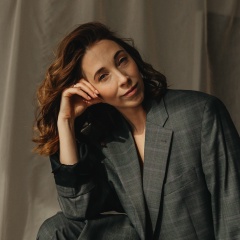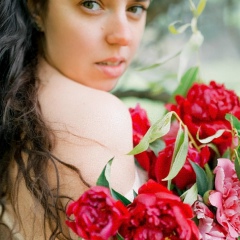Сложны русский язык.
Перед нами стол. На столе стакан и вилка. Что они делают? Стакан стоит, а вилка лежит. Если мы воткнем вилку в столешницу, вилка будет стоять. То есть стоят вертикальные предметы, а лежат горизонтальные? Добавляем на стол тарелку и сковороду. Они вроде горизонтальные, но на столе стоят. Теперь положим тарелку в сковородку. Там она лежит, а ведь на столе стояла. Может быть, стоят предметы готовые к использованию? Нет, вилка–то готова была, когда лежала.
Теперь на стол залезает кошка. Она может стоять, сидеть и лежать. Если в плане стояния и лежания она как–то лезет в логику "вертикальный–горизонтальный", то сидение — это новое свойство. Сидит она на попе. Теперь на стол села птичка. Она на столе сидит, но сидит на ногах, а не на попе. Хотя вроде бы должна стоять. Но стоять она не может вовсе. Но если мы убьём бедную птичку и сделаем чучело, оно будет на столе стоять. Может показаться, что сидение — атрибут живого, но сапог на ноге тоже сидит, хотя он не живой и не имеет попы. Так что, поди ж пойми, что стоит, что лежит, а что сидит.
А мы ещё удивляемся, что иностранцы считают наш язык сложным и сравнивают с китайским.
(c) не знаю
Перед нами стол. На столе стакан и вилка. Что они делают? Стакан стоит, а вилка лежит. Если мы воткнем вилку в столешницу, вилка будет стоять. То есть стоят вертикальные предметы, а лежат горизонтальные? Добавляем на стол тарелку и сковороду. Они вроде горизонтальные, но на столе стоят. Теперь положим тарелку в сковородку. Там она лежит, а ведь на столе стояла. Может быть, стоят предметы готовые к использованию? Нет, вилка–то готова была, когда лежала.
Теперь на стол залезает кошка. Она может стоять, сидеть и лежать. Если в плане стояния и лежания она как–то лезет в логику "вертикальный–горизонтальный", то сидение — это новое свойство. Сидит она на попе. Теперь на стол села птичка. Она на столе сидит, но сидит на ногах, а не на попе. Хотя вроде бы должна стоять. Но стоять она не может вовсе. Но если мы убьём бедную птичку и сделаем чучело, оно будет на столе стоять. Может показаться, что сидение — атрибут живого, но сапог на ноге тоже сидит, хотя он не живой и не имеет попы. Так что, поди ж пойми, что стоит, что лежит, а что сидит.
А мы ещё удивляемся, что иностранцы считают наш язык сложным и сравнивают с китайским.
(c) не знаю
Complex Russian language.
Before us is a table. On the table is a glass and a fork. What are they doing? A glass is standing, and a fork is lying. If we stick the plug in the countertop, the plug will stand. That is, there are vertical objects, but horizontal ones? Add a plate and a pan to the table. They seem to be horizontal, but stand on the table. Now put the plate in the pan. There she lies, but stood on the table. Maybe there are items ready for use? No, the fork was ready when she lay.
Now a cat climbs onto the table. She can stand, sit and lie. If in terms of standing and lying, it somehow creeps into the “vertical – horizontal” logic, then sitting is a new property. She is sitting on the pope. Now a bird has sat on the table. She sits on the table, but sits on her feet, not on the pope. Although it seems to be standing. But she cannot stand at all. But if we kill the poor bird and make a scarecrow, it will stand on the table. It may seem that sitting is an attribute of the living, but the boot also sits on the leg, although it is not alive and has no priests. So, go and understand what is standing, what is lying, and what is sitting.
And we are still surprised that foreigners find our language difficult and compare with Chinese.
(c) I don't know
Before us is a table. On the table is a glass and a fork. What are they doing? A glass is standing, and a fork is lying. If we stick the plug in the countertop, the plug will stand. That is, there are vertical objects, but horizontal ones? Add a plate and a pan to the table. They seem to be horizontal, but stand on the table. Now put the plate in the pan. There she lies, but stood on the table. Maybe there are items ready for use? No, the fork was ready when she lay.
Now a cat climbs onto the table. She can stand, sit and lie. If in terms of standing and lying, it somehow creeps into the “vertical – horizontal” logic, then sitting is a new property. She is sitting on the pope. Now a bird has sat on the table. She sits on the table, but sits on her feet, not on the pope. Although it seems to be standing. But she cannot stand at all. But if we kill the poor bird and make a scarecrow, it will stand on the table. It may seem that sitting is an attribute of the living, but the boot also sits on the leg, although it is not alive and has no priests. So, go and understand what is standing, what is lying, and what is sitting.
And we are still surprised that foreigners find our language difficult and compare with Chinese.
(c) I don't know
У записи 4 лайков,
0 репостов.
0 репостов.
Эту запись оставил(а) на своей стене Айван Малахов

























